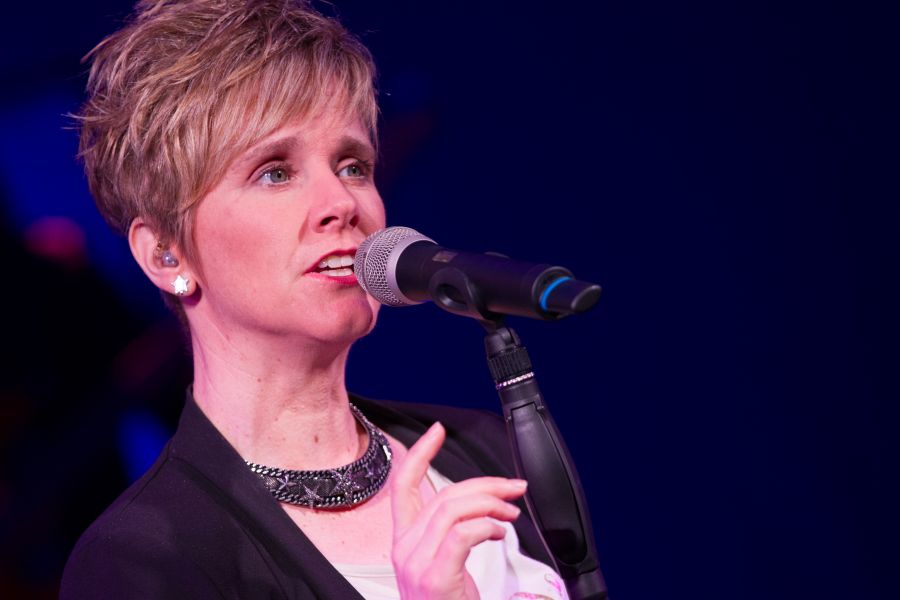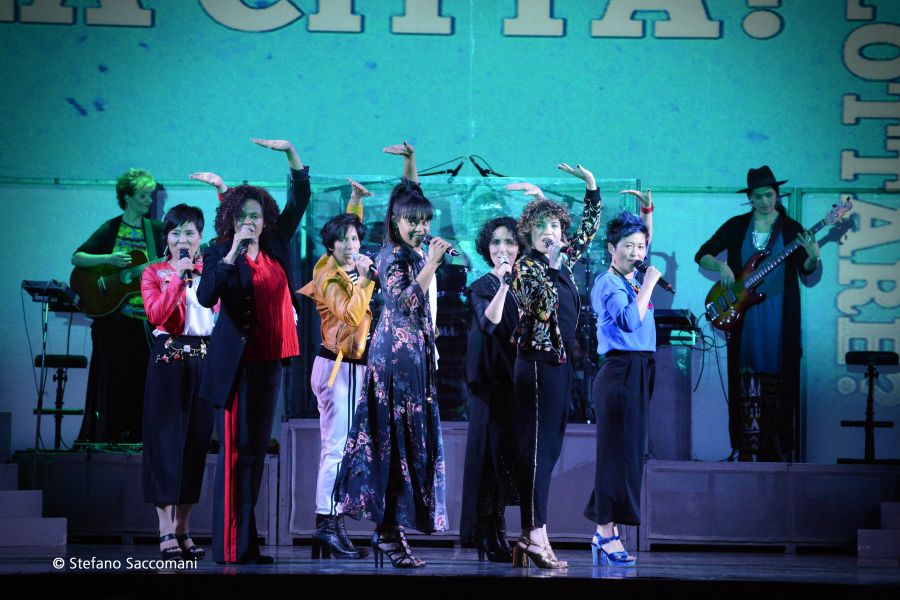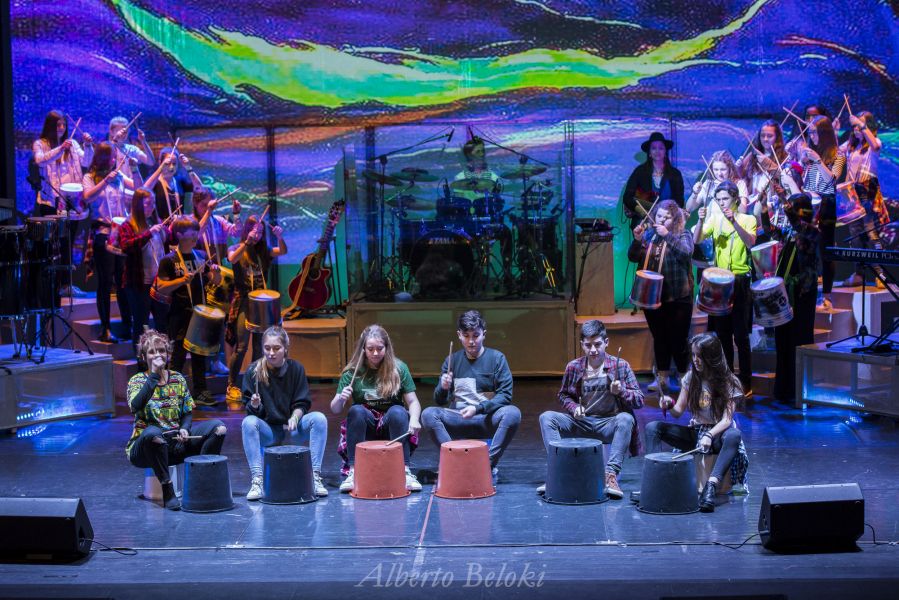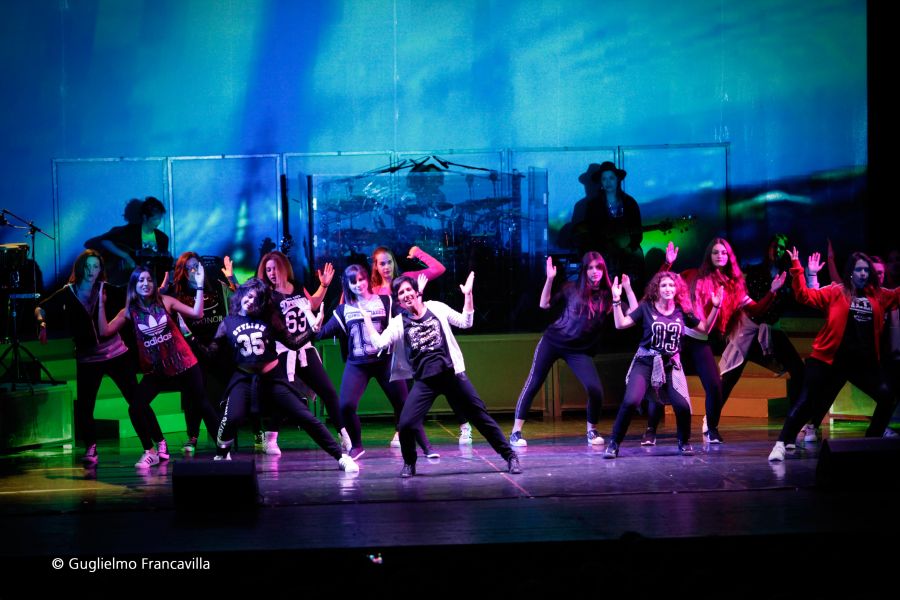
Workshop
Music knows no borders

We caught up with Nancy Uelmen, composer, singer and keyboardist in the all-female international performing arts group Gen Verde.
Born and raised in Los Angeles, California, for the past twenty-five years Nancy Uelmen has been living and working in the Tuscan hills, alongside her 21 fellow band members. We talked about her relationship to music and about the special power this art form has to build bridges between peoples and cultures.
Nancy, what is music to you?
Aside from being a great opportunity to express what you feel, music to me is something that unites us all, because it’s an art form that goes beyond languages. When I think about my own experience, it’s clear to me that music has the great power to create bridges of fraternity. And that’s because music is easy to understand: someone who is different from you will be happier and more willing to listen to your song rather than just your words.
Through songs, Gen Verde, the band you’re part of, wants to tell the world that it is possible to choose peace over war, unity instead of walls, dialogue over silence. In your opinion, what makes music such a powerful medium to get this message across, to build fraternity?
 Music is harmony. By nature, music is made up of separate elements that need to listen to each other and ‘give’ themselves to each other. When people play music together, they have the opportunity to both be themselves and make space for one another. That’s how harmony is created.
Music is harmony. By nature, music is made up of separate elements that need to listen to each other and ‘give’ themselves to each other. When people play music together, they have the opportunity to both be themselves and make space for one another. That’s how harmony is created.
Making space for others and trying to see the world from their perspective are the first steps towards achieving peace: that’s the theme of your latest album, On the Other Side.
Yes. All the songs in our latest album are either about our personal stories or about the stories of people who lived their lives that way, including people who sacrificed their lives in extreme situations. The song that gives the title to the album, ‘On the Other Side’, was inspired by the Golden Rule that is found in many religions. In the chorus, there is a line that is repeated several times, that says ‘No one is a stranger to me’: that sentence is taken from the Sikh Sacred Scripture. The song also says ‘What I wish for myself is my wish for you too’, which is a quote from the Quran. We wrote that song in preparation for a special experience we were going to live during our UK tour, in the multicultural city of Birmingham.
How did it go?
It was a very powerful experience. We worked with four young Sikh musicians on creating a piece of music we would perform together during a concert. The Sikhs play religious music, usually only in their place of worship. The fact that they had accepted to work with us was quite extraordinary. We tried our best to understand their approach to music, which is very different from ours, and to adopt their habits, like sitting on the floor to play. We realised how important service was to them, and how impressed they were at seemingly little gestures like being offered a glass of water. I realised that, if you get into a mindset of mutual service, you can build a lot of trust. The concert was very touching. Afterwards, one of the musicians said to us: “My mother always told me not to stop on my way back home from the Gurdwara [place of worship], because the only way to bring the sacred vibration home was to go straight there. I felt the same way after the concert. My wife and I felt that we couldn’t stop to buy food, because we needed to bring that sacred experience we had just lived straight home”. We’re going back to Birmingham in the fall: dialogue goes on and they’ve invited us for another tour.
Gen Verde’s message is especially aimed at young people, with whom you organise workshops and perform concerts. What response do you get?

Our workshop for young people is called ‘Start Here, Start Now: dialogue, peace unity… it begins with me”. Before we start each day, with dance, drama, singing and percussion workshops, we launch a ‘motto’ for the day, though which we challenge ourselves to build peace around us. The first day, for example, we choose ‘Put yourself in the other’s shoes’: one of us shares a story from her own experience, and it’s an invitation to the young people to live their daily life with that mindset. After the workshops, we rehearse and perform in the concert together. The last day we have a feedback session in which they often tell us that what has stayed with them the most are those ‘mottos’. We want to help them understand that if they look at their everyday life from a different angle, they can actually build a united world starting from the little things. Working with young people has given us insights into the problems they face as well as their aspirations, and that has inspired us to create the album we’re working on right now. We feel that they are in constant search of the value of human life, and need to be reminded that we all have light inside of us, and that we can give that light if we love others. We think that this album will complete the message contained in ‘On the Other Side’.
Every workshop must be a very powerful experience, then…

Yes, and it’s like that everywhere we go. Two years ago we were in Asia, in Taiwan, Hong Kong and Macau. A few of the young people we worked with were Christians, some were Buddhists and the majority had no religious beliefs, but music allowed us all to go beyond these differences. We also showed them that unity is possible even within a band like ours, where nearly each component is from a different cultural background. We recently also went to Germany, where we held a workshop inside a refugee camp. The final concert took place on election day, and many people were worried because of the general climate of opposition to migrants you could feel at that time. At the end of the show, one of the participants said: “When I arrived here tonight I was worried about the election result, but in the end I realised what I had to do: live this message, put myself in the other’s shoes with hope, knowing that I have found a new way to live”.
Based on your extraordinary life experience, what advice would you give to someone who would like to put their own music at the service of something greater?
I think that having that aspiration is already a very good start. I believe the key is to see talent as a gift, and not to be afraid of giving it. Personally, I’m very shy, and I never thought that music would become my profession. When I realised that my music could be a gift to others, though, I managed to overcome my shyness. Another important aspect is the ability to listen, the ability to figure out how your artistic intuitions can be of light to others. Making music is in itself a great experience, but when you make music as a gift to others, and you do it with others, it’s even better. That’s when music fulfils its true essence. I think that is precisely why God invented music – because it unites us.



